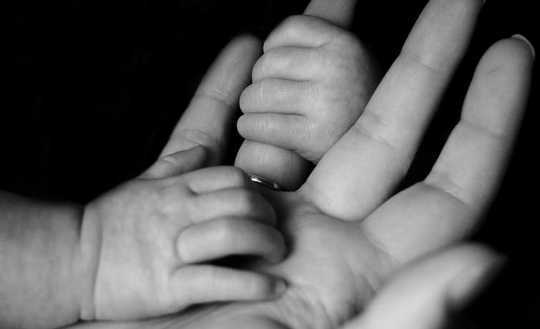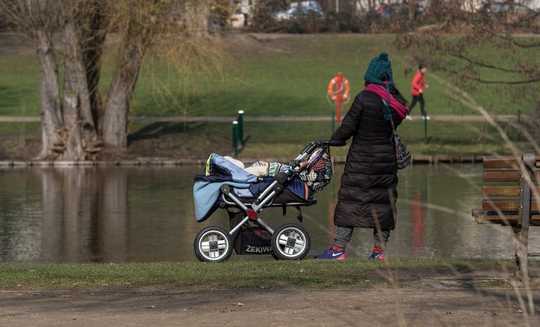 As many as one in five women experience postpartum depression. (Liv Bruce/Unsplash)
As many as one in five women experience postpartum depression. (Liv Bruce/Unsplash)
Up to one in five women will develop postpartum depression, a condition that can adversely affect the thoughts, emotions and functioning of mothers, as well as the mental health of their partners and children.
Adjusting to parenthood after delivery is challenging under normal circumstances, let alone in the midst of a global pandemic. Concerns about exposure to COVID-19, combined with physical distancing recommendations, can worsen depression and decrease access to the resources, such as health care and social supports, that women typically use to build resilience and promote recovery.
Despite these challenges, there are several steps women with postpartum depression can take to optimize their mental health and thrive in the face of COVID-19.
Amplified risk factors
Postpartum depression is the result of a dynamic interplay between biological, psychological and social risk factors, all of which can be amplified by the current pandemic. My research, focused on improving women’s access to psychotherapies and developing perinatal depression treatment guidelines, along with my clinical practice as a psychiatrist, has highlighted the immense strength of women with postpartum depression, as well as their ability to adapt to adversity.
Get The Latest By Email
Many women with postpartum depression are anxious about COVID-19 and how they will manage at home with an infant (and other children). While distancing recommendations are important to controlling the spread of the virus, these limit some of the best weapons women have against postpartum depression. Not only is it more difficult for women to receive support under social distancing, but living in close quarters with children and partners can increase conflict and interfere with adapting to life with a new infant.
Despite these challenges, there are a number of ways that women with postpartum depression can reduce the impact of COVID-19 on their mental health. Indeed, this pandemic may even provide new opportunities for women and their families to flourish.
 Online resources can help new mothers feel less isolated during the COVID-19 pandemic. (Priscilla du Preez/Unsplash)
Online resources can help new mothers feel less isolated during the COVID-19 pandemic. (Priscilla du Preez/Unsplash)
Online resources
First, many physicians and other therapists are now providing telephone or online visits, and public health has made a number of their services available virtually. Psychology Today is another source of information on therapists who offer paid services over the telephone or internet. Hospital emergency departments are an important consideration for women requiring emergency support.
A range of online resources also currently exist to support women with postpartum depression. Several provide support via telephone or text, and apps such as Peanut (a social networking app for mothers), MindMum and Lifeline4Moms may be of assistance to women who are struggling. Multiple cognitive behavioural therapy programs are also available for free online, including the British Columbia Reproductive Mental Health Program and Moodgym.
 Walking is an easy and enjoyable choice for exercise while observing social distancing. (Pixabay)
Walking is an easy and enjoyable choice for exercise while observing social distancing. (Pixabay)
Prioritizing self-care
An awareness of some lifestyle changes that can help optimize the mental health of women with postpartum depression can also aid them in their recovery. A regular routine (as much as is permitted by infants) with a focus on self-care based on NEST-S principles (Nutrition, Exercise, Sleep, Time for Self, Supports) is key. This can begin with taking a shower daily, changing into one’s daytime attire and opening all the blinds since these can really jump start the day.
The importance of proper nutritional intake to mothers cannot be overstated. They should try to eat three meals per day and have available a range of easy snacks. Keeping a container filled with water nearby to stay hydrated can also enhance brain function.
Time for exercise can be a challenge (particularly now), but since it can help with mood, energy and sleep, it’s worth prioritizing. Activities that are enjoyable, brief and easy-to-do (such as walking) are best. If they expose women to the outdoors, all the better (as long as physical distancing recommendations are observed).
Good sleep is also vital. Napping when the baby naps, dividing nighttime feeds 50/50 with partners and observing good sleep hygiene practices, such as maintaining a consistent bedtime routine and avoiding alcohol and caffeine in the evening, can be helpful.
 It’s important to take breaks to do enjoyable activities like reading. (Unsplash)
It’s important to take breaks to do enjoyable activities like reading. (Unsplash)
Studies show that mothers spend up to 164.5 hours a week providing direct and indirect care to infants.
In many cases, they are on call for child care even when sleeping, and are only really off the clock for about 30 minutes a day. Given those demands, good mental health starts with taking breaks. These are best spent relaxing or engaging in activities that are pleasurable and/or stimulating, like reading and walking.
Relaxation techniques like box breathing, a breathing technique that helps manage stress, and progressive muscle relaxation can benefit mothers who are struggling with anxiety or are feeling overwhelmed.
COVID-19 presents unique barriers
Good supports are vital to the mental health of mothers. However, COVID-19 presents unique barriers to engaging supports, particularly those outside of the home. Partners are a logical first choice, but if one is not present (or able), it may be helpful to seek outside help from family or friends. It’s crucial to ensure that anyone who comes in contact with new mothers and infants is at low risk for the coronavirus.
Raising an infant while struggling with postpartum depression can be very overwhelming and requires creative solutions. Telephone calls and videoconferencing with friends and family can also be helpful, as can goal-setting and consistency around personal and social time.
Since many partners may also be at home, COVID-19 provides a special opportunity for couples to work collaboratively. Conversations about labour division that take into account partners’ strengths and limitations can lead to effective plans that optimize breaks, sleep and pleasurable activities.
Partners of women with postpartum depression can help by providing practical assistance (for example, nighttime feeds and household chores) and support, keeping in mind that listening alone (without having to “fix” problems) can be therapeutic.
Perhaps most important of all, it’s important to keep in mind that postpartum depression does improve, and the COVID-19 crisis will pass. Self-care, compassion and engaging one’s partner in the journey to recovery can not only bolster the health of mothers and their families, but build stronger bonds in the long term.![]()
About The Author
Ryan Van Lieshout, Canada Research Chair in the Perinatal Programming of Mental Disorders, McMaster University
This article is republished from The Conversation under a Creative Commons license. Read the original article.
books_health







